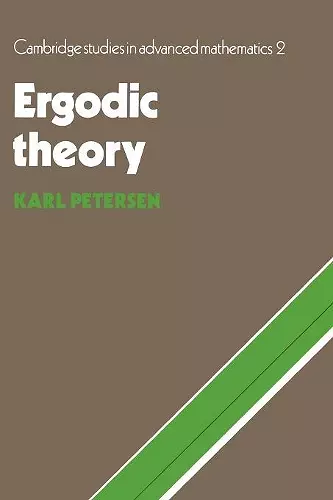Ergodic Theory
Format:Paperback
Publisher:Cambridge University Press
Published:23rd Nov '89
Currently unavailable, and unfortunately no date known when it will be back

This book presents the fundamentals of ergodic theory as well as selected advanced topics.
The study of dynamical systems forms a vast and rapidly developing field, This book introduces the four aspects of ergodic theory ñ examples, convergence theorems, recurrence properties and entropy. These receive first a basic, then a more advanced treatment, with the discussion of several advanced topics that are currently undergoing research.The study of dynamical systems forms a vast and rapidly developing field even when one considers only activity whose methods derive mainly from measure theory and functional analysis. Karl Petersen has written a book which presents the fundamentals of the ergodic theory of point transformations and then several advanced topics which are currently undergoing intense research. By selecting one or more of these topics to focus on, the reader can quickly approach the specialized literature and indeed the frontier of the area of interest. Each of the four basic aspects of ergodic theory - examples, convergence theorems, recurrence properties, and entropy - receives first a basic and then a more advanced, particularized treatment. At the introductory level, the book provides clear and complete discussions of the standard examples, the mean and pointwise ergodic theorems, recurrence, ergodicity, weak mixing, strong mixing, and the fundamentals of entropy. Among the advanced topics are a thorough treatment of maximal functions and their usefulness in ergodic theory, analysis, and probability, an introduction to almost-periodic functions and topological dynamics, a proof of the Jewett-Krieger Theorem, an introduction to multiple recurrence and the Szemeredi-Furstenberg Theorem, and the Keane-Smorodinsky proof of Ornstein's Isomorphism Theorem for Bernoulli shifts. The author's easily-readable style combined with the profusion of exercises and references, summaries, historical remarks, and heuristic discussions make this book useful either as a text for graduate students or self-study, or as a reference work for the initiated.
'What the contents list does not prepare you for is the very high standard of exposition. The scholarship involved in this work will be appreciated by workers in the field and by generations of research students. I personally think this is an excellent book. It is a book which can be explored at leisure and has a place in the library of anyone with a more than passing interest in ergodic theory.' Bulletin of the London Mathematical Society
' … an excellent introduction to several areas which are of interest both from the point of view of the mathematical scholar and from that of the research mathematician.' American Scientist
ISBN: 9780521389976
Dimensions: 229mm x 152mm x 20mm
Weight: 510g
344 pages